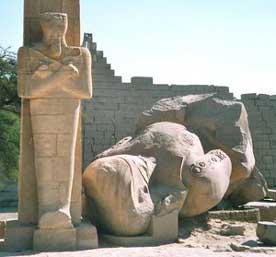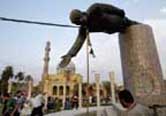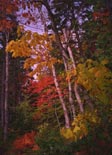Return to Table of Contents
Introduction to Shelley's Defense of Poetry and Discussion Questions for
Ozymandias, Hymn to Intellectul Beauty and Ode to the West Wind
(excerpts from The Norton Anthology of English Literature, Vol. 2.
N.Y.: W.W. Norton Inc., 1974)

Shelley has been called and "idealist" whose writings have little correlation to the REAL world, butan examination of the selections below from his Defense will reveal the opposite. Shelley wrote the Defense as a refutation to his friend, Thomas Peacock's, assertion in The Four Ages of Poetry that poetry had little relevance in an age of science and technology.
Peacock noted, not without considerable wit and irony since he was an accomplished classical scholar, satirist and poet himself, that "...in whatever degree poetry is cultivated, it must necessarily be to the neglect of some branch of useful study: it is a lamentable spectacle to see minds, capable of better things, running to seed in the specious indolence of these empty aimless mockeries of intellectual exertion. Poetry was the mental rattle that awakened the attention of intellect in the infancy of civil society; but for the maturity of mind to make a serious business of the playthings of its childhood, it is as absurd as for a full-grown man to...be charmed to sleep by the jingle of silver bells."
[NOTE: Peacock's criticism is not without merit, as the next literary period, the Victorian, will demonstrate. A problem with Romantic poetry is its tendency to become so intensely subjective that it appears to violate the mimetic theory. Nonetheless, Shelley wanted to respond...]
from Shelley's Defense of Poetry
To be a poet is to apprehend the true and the beautiful, in a word the good that exists in the relation, subsisting, first between existence and perception, and secondly between perception and expression...A poet is the image of life expressed in its eternal truth. [Poetry] is...the creation of actions according to the unchangeable forms of human nature, as existing in the mind of the creator. Poetry contains within itself the germ of a relation to whatever motives or actions have place in the possible varieties of human nature...A poet is a nightingale who sits in darkness and sings with sweet sounds; his audience are as men entranced by the melody of an unseen musician, who feel they are moved and softened, yet no not whence or why. Nor let it be objected that these characters [characters a poet writes about that may be immoral like Macbeth] are remote form moral perfection...a poet considers the vices of his contemporaries as the temporary dress in which his creations must be arrayed, and which cover without concealing the eternal proportions of their beauty...The beauty of the internal nature cannot be so far concealed by its accidental vesture. The whole objection to the immorality of poetry rests upon a misconception...Poetry acts in another and diviner manner. Poetry awakens and enlarges the mind itself by rendering the receptacle of a thousand unapprehended combinations of thought. Poetry lifts the veil from the hidden beauty of the world, and makes familiar objects be as if they were not familiar.
The great secret of morals is love, or a going out of our own nature, and an identification of ourselves with the beautiful which exists in thought, action, or person not our own. A man to be greatly good must imagine intensely and comprehensively; he must put himself in the place of another and of many others. The great instrument of moral good is the imagination and poetry enlarges the circumference of the imagination by replenishing it with thoughts of ever new delight which have the power of attracting and assimilating to their own nature all others thoughts and which form new intervals and interstices whose void forever craves fresh food.
We want the creative faculty to imagine that which we know; we want the generous impulse to act that which we imagine; we want the poetry of life; our calculations have outrun conception; we have eaten more than we can digest The cultivation of those sciences which have enlarged the limits of the empire of man over the external world has, for want of the poetical faculty, proportionally circumscribed those of the internal world, and man, having enslaved the elements, remains himself a slave.
A man cannot say, "I will compose poetry," for the mind in creation is as a fading coal, which some invisible influence, like an inconstant wind, awakens to transitory brightness. This power arises from within, like the colour of a flower which fades and changes as it is developed. Poetry turns all things to loveliness. It exalts the beauty of that which is most beautiful...Poetry defeats the curse which binds us to be subjected to the accident of surrounding impressions...It equally creates for us a being within our being. It compels us to feel that which we perceive and to imagine that which we know.
PLATO'S INFLUENCE ON SHELLEY
PLATO'S PHAEDRUS:
The soul in its totality has the care of all that is inanimate, and traverses the whole heaven, appearing now in one shape, now in another, when it is perfect, and fully winged, it soars on high and regulates the entire world. [we remember] those things which once our soul beheld when it went in the procession with its god, when on high it viewed the things we now say are, when it lifted up its head towards true existence. Wherefore rightly is the mind of the lover of wisdom only winged; for with all the power he has, he gives himself in memory to those things by communing with which god is divine. But since he turns away from the concerns of men, and cleaves to the divine, the world rebukes him for a madman; the many see not that he is a man inspired...when he sees the beauty here below, in remembrance of the veritable beauty is fledged with wings, and quivering, would fain mount upward, but he cannot and only gazes up, like a bird indifferent to everything below.
SHELLEY:
[Love is] that powerful attraction towards all that we conceive, or fear, or hope beyond ourselves, when we find within our own thoughts the chasm of an insufficient void, and seek to awaken in all things that are, a community with what we experience within ourselves...For what are we? When do we come, and wither do we go? Is birth the commencement, is death the conclusion of our being? What is birth and death? I am one of those who am unable to refuse my assent to the conclusions of those philosophers to assert that nothing exists but as it is perceived. The shocking absurdities of the popular philosophy of mind and matter, its fatal consequences in morals, and their violent dogmatism concerning the source of all things, had early conducted me to materialism. This materialism is a seducing system to superficial minds...it dispenses them from thinking. Whatever may be his true and final destination, there is a spirit within him at enmity with nothingness and dissolution.
SHELLEY ON MILTON'S SATAN
..Milton's poem contains within itself a philosophical refutation of that system, of which, by a strange and natural antithesis, it has been a chief popular support. Nothing can exceed the energy and magnificence of the character of Satan as expressed in Paradise Lost. It is a mistake to suppose that he could ever have been intended for the popular personification of evil. Implacable hate, patient cunning, and a sleepless refinement of device to inflict the extremest anguish on an enemy, these things are evil; and, although venial in a slave, are not to be forgiven in a tyrant; although redeemed by much that ennobles his defeat in one subdued, are marked by all that dishonors his conquest in the victor. Milton's Devil as a moral being is as far superior to his God, as one who perseveres in some purpose which he has conceived to be excellent in spite of adversity and torture is to one who in the cold security of undoubted triumph inflicts the most horrible revenge upon his enemy, not from any mistaken notion of inducing him to repent of a perseverance in enmity, but with the alleged design of exasperating him to deserve new torments. Milton has so far violated the popular creed (if this shall be judged to be a violation) as to have alleged no superiority of moral virtue to his God over his Devil.
[From A Defense of Poetry, 1821]
...The only imaginary being resembling in any degree Prometheus is Satan; and Prometheus is, in mv judgement, a more poetical character than Satan, because, in addition to courage, and majesty, and firm and patient opposition to omnipotent force, he is susceptible of being described as exempt from the taints of ambition, envy, revenge, and a desire for personal aggrandizement, which, in the hero of Paradise Lost, interfere with the interest. The character of Satan engenders in the mind a pernicious casuistry which leads us to weigh his faults with his wrongs, and to excuse the former because the latter exceed all measure. In the mind of those who consider the magnificence fiction with a religious feeling it engenders something worse. But Prometheus is, as it were, the type of the highest perfection of moral and intellectual nature, impelled by the purest and th truest motives to the best and noblest end.
from Preface to Prometheus Unbound, 1820)
Questions on Shelley's Poetry:
1. Ozymandias
--Compare these pictures:
2. Hymn to Intellectual Beauty should be read before Ode to The West Wind. The former's 'geometry' was modified in the latter poem. Being noting why so many similes are used in Hymn, and then look for the diction that suggests the geometry.
3. Find the geometric pattern in the Ode. Also examine of course the following:
-the use of paradox
-macrocosmic and microcosmic images
-classical allusions
-a series of analogies that fuse the macro and micro images
4. Complete the comparative analysis by demonstrating that Shelley solved the dilemma raised in the first poem in the second one.
Source :
Abrams, M.A. (ed.). The Norton Anthology of English Literature. Volume II. fifth edition. New York: W.W. Norton, 1986.
GENERAL GUIDES TO LITERATURE, CHRONOLOGIES, SOCIAL AND POLITICAL PHILOSOPHIES, AND SCRIPTURAL/THEOLOGICAL REFERENCES CURRICULUM LINKS
THE ROMANTIC PERIOD CURRICULUM LINKS



